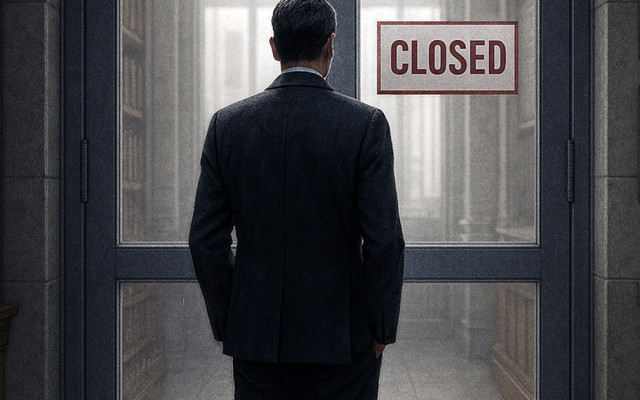
Suspension of legal practice for failure to improve professional skills: court decision

An advocate who has not improved his professional level for years is in continuous violation of the Rules of professional conduct for advocates and deserves to have his right to practice suspended. The legitimacy of this decision was confirmed by the Court of appeal.
In August 2024, the HSA appealed to the QDCB of the Poltava region with a complaint against an advocate who had not improved his professional level since 2019. The Disciplinary Chamber recognized this as a disciplinary offense and brought him to justice, issuing a warning, according to the official website of the HQDCB.
The HSA appealed this decision to the HQDCB, which changed the decision regarding the penalty – the advocate’s right to practice law was suspended for six months, noting that this was commensurate with the nature of the disciplinary offense committed (systematic, over a period of five years, violation of the Rules of professional conduct for advocates).
The advocate filed a lawsuit. The court of first instance refused to satisfy the claim. The judge proceeded from the fact that the High Qualification and Disciplinary Commission of the Bar, following the consideration of the complaint against the decision of the Regional Qualification and Disciplinary Commission of the Bar, had the right to change this decision. This included the disciplinary penalty imposed on the advocate. No violations of the procedure for adopting the contested decision were found. Referring to the legal conclusions of the Supreme Court set out in its rulings of October 12, 2021, in case No. 820/4158/18 and October 19, 2023, in case No. 280/1396/22, the court noted that within the scope of this case, it could provide a legal assessment of the decision of the HQDCB solely in the context of compliance with the relevant procedure, without interfering with the legal assessment of the evidence provided by the disciplinary body.
In addition, the court referred to the position of the Supreme Court set out in its ruling of November 21, 2018, in case No. 815/171/17: systematic violation of the RPC constitutes the commission of several violations during the relevant period. Given the absence in the disciplinary proceedings of evidence confirming the circumstances of the plaintiff's annual professional development, the court of first instance concluded that the HQDCB imposed a penalty on the advocate in accordance with the law and within the time limit for bringing the plaintiff to disciplinary responsibility. After all, the moment when an ongoing offense ceases is when the offender fulfills their established obligation. At the same time, the plaintiff never fulfilled their professional obligation to improve their professional level.
When reviewing the case, the Second administrative court of appeal proceeded from the fact that the plaintiff had not fulfilled his obligations to improve his professional level for five years, i.e., he had committed five violations of the RPC, which indicates the presence of such a sign as systematicity.
And given the commission of several ongoing violations, as confirmed by the case materials, and taking into account Article 31 of the Law «On Advocacy and the Practice of Advocacy», the conclusion of the court of first instance, which agreed with the position of the HQDCB, is well-founded.
Taking into account these and other circumstances, the Second administrative court of appeal decided to dismiss the advocate’s appeal and leave the decision of the court of first instance unchanged. The relevant decision of 07.07.2025 in case No. 440/1563/25 became final.
«Improving professional standards is not a formality, but one of the professional duties of every advocate, enshrined in the Law «On Advocacy and the Practice of Law». The continuous deepening, expansion, and updating of their professional knowledge, skills, and abilities by advocates ultimately ensures that every person can exercise their right to a fair trial, - noted Andriy Misiats, the acting Head of the High Qualification and Disciplinary Commission of the Bar. - Therefore, the duty of professional self-improvement is the key to public trust in the advocacy. And responsibility for systematic failure to fulfill professional duties is a tool for maintaining the high level of the legal profession, which works to protect the rights of citizens».
© 2026 Unba.org.ua Всі права захищені
"Національна Асоціація Адвокатів України". Передрук та інше використання матеріалів, що розміщені на даному веб-сайті дозволяється за умови посилання на джерело. Інтернет-видання та засоби масової інформації можуть використовувати матеріали сайту, розміщувати відео з офіційного веб-сайту Національної Асоціації Адвокатів України на власних веб-сторінках, за умови гіперпосилання на офіційний веб-сайт Національної Асоціації Адвокатів України. Заборонено передрук та використання матеріалів, у яких міститься посилання на інші інтернет-видання та засоби масової інформації. Матеріали позначені міткою "Реклама", публікуються на правах реклами.